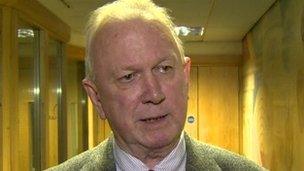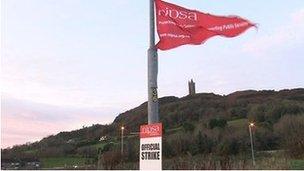Strike 'biggest day since 1979 Winter of Discontent'
- Published
A strike by public sector workers was the biggest day of industrial action since the 1979 "Winter of Discontent", trade union leaders have said.
The Irish Congress of Trade Unions estimated that more than 100,000 public sector workers took part in the strike in Northern Ireland.
Thousands of strikers converged on Belfast City Hall and NI towns for rallies opposing changes to pensions.
Trade unionists also picketed hundreds of civil service buildings.
Translink said there was a total shut down of all rail and bus services.
It is thought that about two-thirds of all schools in Northern Ireland - that is about 800 - were closed.
The five health trusts said hospitals coped, having cancelled non-critical procedures.
The employers' organisation, the CBI, said the biggest impact on the private sector was people not being able to get to work because of either disruption to public transport or parents having to stay at home to look after children due to school closures.
Some businesses reported trade had nose-dived, particularly those which rely heavily on commuters and office staff.
However, some other shops in Belfast city centre reported that trade was better than expected - with families taking advantage of the day off.
First Minister Peter Robinson said he was "disappointed" to hear a union leader at the weekend saying that it did not matter what the government said, the strike would go ahead.
"That indicated that they were determined they were going to have this strike. That is a mistake. They need to be sitting down with the government to resolve these matters," Mr Robinson said.
"Gambled billions"
Peter Bunting of the Irish Congress of Trade Unions, told a rally at Belfast City Hall on Wednesday that public sector workers should be commended.
He said they had made a sacrifice to help everyone by striking on Wednesday.
"The real extremists in our society are those who evade and avoid tax, those who have gambled billions with other peoples' money to sate their greed, and those politicians who have decreed that ordinary people, private sector workers, public sector workers and the most vulnerable of all - the unemployed, the sick, women and children, and senior citizens - will pay for the criminal conduct of the pampered elite," Mr Bunting said.
He told the crowd who gathered in Belfast city centre that "the elite" had awarded themselves 50% pay increases in the past year and received £22bn in tax relief for their pensions.
"Rather than complain about today, the business community should consider the long term," he said.
"The loss of one day's pay for going on strike is worth it, because if the Tories get their way, public sector workers will have one day's pay docked, every single month, forever, to pay off the bankers' debt."
Mr Bunting, who represents the Northern Ireland committee of ICTU, reaffirmed its demands that the rich "pay their fair share" and that investment be made in jobs, services and infrastructure.
The Belfast rally was one of a series of lunchtime protests being held throughout Northern Ireland, with others taking place in Londonderry, Newry, Downpatrick, Omagh, Ballymena, Portadown, Magherafelt and Cookstown.

Mr Kelly said union members felt enough was enough
Jimmy Kelly, regional organiser of the Unite union, said: "We have been brought to a situation where our members across health, education, local government, transport are really declaring that enough is enough.
"This time next year it will be too late trying to put things back together again."
Speaking in the House of Commons, Secretary of State Owen Paterson condemned the strike.
He said it would not bring a single job to Northern Ireland and he urged the unions to work with the government.
Workers in health, education, transport, the civil service, councils and the assembly took part in the strike along with those from a host of other non-departmental public bodies.
Clinical and medical staff in Northern Ireland hospitals worked as normal, as the British Medical Association and Royal College of Nursing are not taking industrial action.
However, some staff who belong to other unions were on strike.
The Department of Health said there was cover for those requiring emergency services, but that non-critical planned procedures and appointments were cancelled.

A trade union flag close to Scrabo Tower, Newtownards
In the Belfast Trust 3,500 appointments were postponed, while in the Southern Trust 1,017 out-patient appointments and 140 theatre slots were postponed.
New appointments
Day centres also closed, but some learning disability centres still provided services.
Jim McKeown, regional official of UCU (University and College Union), said there had been very little activity or teaching in further education colleges across Northern Ireland.
The only college which did not have a significant turnout on strike is Stranmillis University College.
The Driver and Vehicle Agency in Northern Ireland told customers who had booked a vehicle or driving test to attend the test centre.
Where insufficient staff were available to deliver booked tests, a new appointment was made at no additional cost, the agency said.
The vast majority of shops and businesses were open and many of the big private sector employers in NI were working as normal.
Both Belfast International Airport and George Best Belfast City Airport said the strikes did not have a significant impact on their services.
The police advised motorists to allow extra time for their journeys due to "anticipated additional traffic volume".
- Published1 December 2011
- Published30 November 2011
- Published29 November 2011
- Published29 November 2011
- Published29 November 2011
- Published30 November 2011